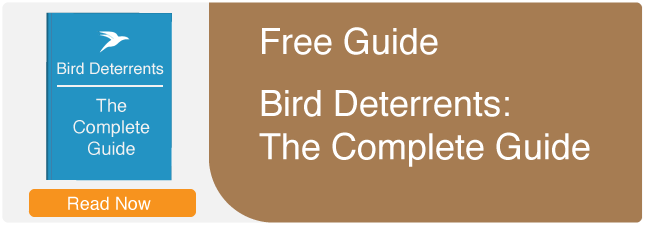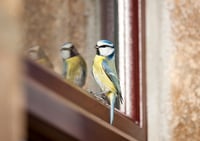 Most of us enjoy various forms of nature. Having our feathered friends around is one pleasure nature brings. Many homeowners encourage their presence by offering bird feeders and houses. All of this is fine and good, but you should also be aware that some birds can also pose a health risk. Birds can carry diseases, including fungal infections such as cryptococcosis and several others. Those diseases are most often distributed through bird excrement, which tends to pile up where they roost.
Most of us enjoy various forms of nature. Having our feathered friends around is one pleasure nature brings. Many homeowners encourage their presence by offering bird feeders and houses. All of this is fine and good, but you should also be aware that some birds can also pose a health risk. Birds can carry diseases, including fungal infections such as cryptococcosis and several others. Those diseases are most often distributed through bird excrement, which tends to pile up where they roost.
Types of Disease Birds Can Carry
Several types of birds carry diseases. Some of the worst offenders are pigeons. The most common species of pigeon around the world is the rock pigeon, which can be found just about anywhere in the U.S. Although considered wild birds, rock pigeons are quite docile. As a result, many people consider them appealing to feed and try to domesticate. This is a bad idea considering those diseases which they may carry.
According to Medical News Today, birds carry more than 60 diseases that can be transmitted through their fecal matter. Some of these diseases include:
- • Cryptococcosis
- • Histoplasmosis
- • Candidiasis
- • Saint Louis encephalitis
- • Salmonellosis
- • E. coli
- • Psittacosis
All of these and more can make humans ill, with more severe cases for some.
What Is Cryptococcosis, and Where Does It Come From?
 Cryptococcus is a fungus that can be found throughout the world. It is found in soil, decaying wood, and bird droppings. The infection comes from breathing in the fungal spores. While most people exposed to cryptococcus do not come down with symptoms, those with some immune-compromised conditions may develop the disease.
Cryptococcus is a fungus that can be found throughout the world. It is found in soil, decaying wood, and bird droppings. The infection comes from breathing in the fungal spores. While most people exposed to cryptococcus do not come down with symptoms, those with some immune-compromised conditions may develop the disease.
It is also possible to be exposed to the fungus many years before seeing signs of illness. This can occur at a time when one's immune system becomes compromised, especially for those who are infected with HIV. Other conditions that lower one's resistance to this fungus include Hodgkin Lymphoma, other lymphomas, sarcoidosis, and long-term corticosteroid therapy. Those who have received an organ transplant may also be at an elevated risk.
According to the Center for Disease Control, cryptococcosis usually affects the lungs, but it can also attack the central nervous system. Symptoms for those infected with cryptococcosis in the lungs include cough, shortness of breath, chest pain, fever. When the fungus infects the brain, also known as cryptococcal meningitis, symptoms include headache, fever, neck pain, nausea and vomiting, sensitivity to light, and confusion or behavior changes.
Some of the alternative names for cryptococcosis include Busse-Buschke Disease, European Blastomycosis, Torular Meningitis, or Torulosis.
Who Can Get Cryptococcosis, and What Are the Treatment Methods?
In the U.S., this fungus is more apt to show signs in men in their 40s to 60s, according to the National Organization for Rare Disorders. But that does not mean women or children are immune to the disease. While generally thought to be more prevalent in the Southeast, many cases have been recorded in the Northwest.
Whether cryptococcosis affects the lungs or brain, treatment consists of long-term antifungal medication, which may or may not be effective. According to the Mayo Clinic, this disease is not only life-threatening but may also recur following treatment. The drugs prescribed for the treatment of cryptococcosis may also cause serious side effects. The best combative measures are those of prevention.
Concerns About Cryptococcosis and Other Bird Diseases at Home
Birds have learned to live around humans. People who live in rural areas probably enjoy seeing a wide variety of birds around their homes. But birds have also adapted to life in big cities — especially pigeons. Allowing pigeons to congregate and nest around your house, garage, or barn, including the eves and rafters, should be discouraged.
If you have birds around, you know they can leave a mess. When cleaning up after birds, it is important to wear a mask so as not to breathe in the dust from their droppings. Disposable gloves should also be worn, and any skin exposed to the droppings should be washed following possible contamination, especially before eating or drinking.
Not only can pigeons and other birds be harmful to your health, but they can also cause damage to your home, outbuildings, and vehicles. There are ways to repel birds without harming them. Birds will relax and socialize close to where they find a food source. One simple deterrent is not to feed them, at least not close to the house.
The Responsibility of Property Owners and Commercial Businesses in Disease Prevention
In big cities like New York City, property owners are responsible for maintaining their properties. This includes cleaning up after birds and removing their droppings. According to New York City's government website, anyone living or working in an unsanitary situation should consider calling their city government.
While it is not illegal to feed or keep pigeons, someone may file a complaint if it results in unsanitary conditions. Cities all around the country have similar stances on unsanitary conditions due to birds and their excrement.
Following regulations and governmental requirements for cleaning up after birds is essential. The cleanup of larger facilities requires even more protection. Recommendations include wearing disposable coveralls, putting on gloves, and having foot coverings over your shoes. Rather than simply a mask, a respirator could be warranted.
If there are large amounts of droppings, soaking them and then shoveling is a better alternative than sweeping or using a high-power hose. All materials should be placed in multi-ply plastic bags and within secure containers until disposed of properly.
Birds and bird droppings can also cause significant damage to large buildings, including their roofs, beams, eves, ventilation systems, and more. Again, the best protection is prevention.
Prevention of Bird-Carrying Diseases Such as Cryptococcosis
There is no doubt that avian life is beneficial and beautiful. Birds act as pollinators for a variety of fauna. They also aid in insect reduction. But too much of a good thing too close to a living or working situation can be a cause for concern.
While birds are not the only method of transmission for the diseases they can carry, they may be the most prevalent. Whether you are a homeowner or a commercial business owner, checking into options to keep birds away from your property is a wise decision for protecting both it and the people around it. Contact us so we can help show you how.
About Bird Barrier
Bird Barrier is a leader in innovative technology designed to prevent birds from landing, roosting or nesting. We specialize in urban bird control to remove birds humanely and effectively. Our website, birdbarrier.com, hosts a wealth of content to help people understand and identify bird control solutions for various problems with pest birds. Please contact us if you need help with a bird related problem. You may also benefit from our free guide, Bird Deterrents: The Complete Guide.






